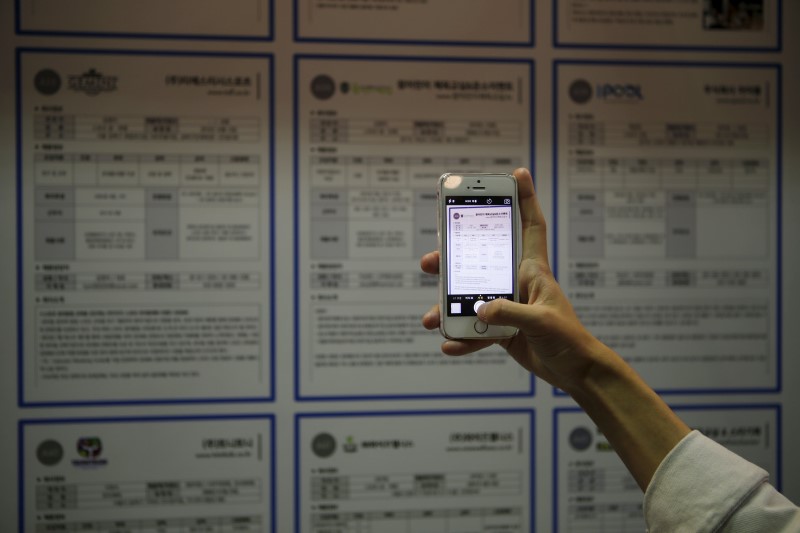By Choonsik Yoo
SEOUL (Reuters) - In the past year, Kim Yoon-sung applied to about 120 companies for a job, and could not land even one.
Instead, the 26-year-old South Korean is on her fourth outsourcing contract, one of tens of thousands of young graduates struggling to get regular employment in Asia's fourth-largest economy.
"It's become normal for people in my generation to fail even after writing applications for well over 100 companies," Kim told Reuters. "The situation is just getting tougher."
South Korea's rigid labour market is increasingly seen as a drag on an ailing economy that President Park Geun-hye says needs "major surgery."
Park is pushing a revamp in labour laws that would be the biggest in nearly two decades. It would change the system of stable employment and seniority-based remuneration that was part of a social contract enforced by the unions and underpinned South Korea's breakneck economic growth into the 1990s.
Park wants to make it easier for companies to fire underperformers, base wages on merit, shorten work hours, ease outsourcing rules and expand unemployment insurance.
Her ruling party hopes to push labour reform legislation through the current session of parliament ending in December, but faces opposition from some unions and the main rival party.
However, the conglomerates that have driven South Korea's emergence as an industrial power support more flexible labour laws.
"This is the first time in many years that we are trying to do something to change a problem that is getting ever more serious," said Kim Dong-one, the dean of Korea University's business school.
Limited labour flexibility makes it harder to build the services sector in an economy dominated by companies like Samsung (LONDON:0593xq) Electronics (KS:005930) and Hyundai Motor (KS:005380). Young graduates covet the big conglomerates for their better-paid jobs, and are less inclined to join smaller companies that would follow Park's "creative economy" push.
The World Economic Forum ranks South Korea 86th for overall labour market efficiency and 106th for flexibility in hiring and firing; Japan, whose decades of stagnation are often invoked by Korean policymakers as a cautionary tale, ranks 22nd and 133rd.
POLITICAL OPPOSITION
The Korean Confederation of Trade Unions (KCTU), the more strident of two big labour umbrella groups, says the reforms would hurt job security and wages and destroy collective bargaining and has vowed to oppose all ruling party candidates at parliamentary elections due next April.
On Wednesday, it called a nationwide strike and held a rally in Seoul that drew thousands of people, with some protesters scuffling with police.
The opposition New Politics Alliance for Democracy (NPAD) is demanding any change in labour laws be tied to requiring firms to share more profits and increase employment.
With 47 percent of parliamentary seats, the opposition cannot by itself block law changes, although the NPAD holds the chairmanship of a key committee that would review law revisions.
The government is betting that enough voters are discouraged by their job prospects to make it worth pushing the legislation ahead of the parliamentary elections.
The last time South Korea made major changes to labour rules was in 1998, when it enabled companies to lay off workers under emergency circumstances in exchange for a bailout from the International Monetary Fund.
At 22 percent, the share of temporary workers in South Korea is double the OECD average. Non-permanent workers are falling further behind on wages, earning 54 percent of what regular employees earn for similar work in South Korea, compared with 65 percent in 2004, government data shows.
Youth unemployment hit a 16-year high early this year and could worsen as the retirement age begins to rise in 2016.
Kim, who studied Chinese language and literature and spent six months as an exchange student in Beijing, earns about 1.2 million won ($1,007) a month in her temporary job, roughly half the average starting salary for staff positions at Korean firms, based on publicly available data.

She said she has lowered her expectations: "I am no longer looking at big companies but just hope to get an opportunity at any company doing business with China."